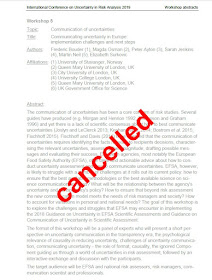That 30-second clip above (which might be blocked by Channel 4) was all that remained of an interview that lasted an hour. Magda says:
I was specifically invited on the program – the brief was that there was a very speculative technique now available via the NHS, that is claimed to use Nudge methods to help lose weight (because, the rationale is that it is designed to target people's unconscious processes subliminally – this is grossly inaccurate for reasons, first, because subliminal means below the threshold of conscious attention, but people’s attention is consciously directed to the messages being played to them via this NHS weight loss technique, and second, nudge has nothing to do with targeting the unconscious subliminally).
They were aware that I have critical views on nudge and on work to do with the unconscious and so they wanted an expert to discuss the issues and why there might be some reason to doubt the findings and the claims made by the NHS hypnotherapeutic technique which proposes that people don’t need to use any willpower to lose weight, their unconscious will do all the work because the technique will rewire their conscious thoughts.
I spent an hour being interviewed, and several of the questions concerned topics such as, ‘why is it that people say they have lost weight using this technique?’, and to speculate why it might be that people on the programme that would trial the technique might also lose weight, even if I’m suggesting that the method itself is unlikely to be effective because the evidence for it working is weak, and the theoretical basis for it is flawed? My answers to these questions were that there are statistical reasons for why it is that some people will show that they have lost weight as a result of the technique, but that has nothing to do with the technique itself. It is more to do with understanding random fluctuations in behaviour in samples that are tested. Also, the psychological factor is that, once people tell other people that they want to lose weight, and that they are going on a programme on national television (where they are filmed before and after the method), this places a high incentive on them to try to lose weight. Actually losing weight then may have nothing to do with the technique itself, but more to do with the willingness, motivation and commitment people will put in to do the mundane things that are absolutely necessary to lose weight, which is eat less fatty food, eat more healthily, and exercise more.
So, I spent an hour discussing these things, giving very clear and cogent reasons and examples (which they had specifically asked for) to demonstrate why it is that the method they were asking me to talk about is problematic, and should be considered with a huge degree of scepticism.
But what happened on the show was a set up. They filmed people motivated to take part in the trial of the method, they did not present many details about the method, or the patchy and problematic evidence base for it, then they bring me on and edit my interview so that I am shown to pooh-pooh the technique, and then they bring on people as testimonials of the technique’s success, and point out that 'the expert has got it wrong'
Obviously I didn’t get it wrong, because it was what I had predicted, but the piece was edited in a way to show that the value of one or two people’s experience is of equal or more weight than the value of 15 years worth of study in a field of work, which entails summarising thousands of data points.
This does nothing for helping people understand core issues to do with sampling, statistical inference, the value of a good causal understandings of evidence, the value of expertise, and the need for scepticism.On top of that experience Magda and more of my colleagues were invited to submit a workshop to the International Conference on Uncertainty in Risk Analysis 2019, sponsored by the European Food Safety Authority (EFSA) and the German Federal Institute for Risk Assessment (BfR). Their workshop was one of five invited. Yet, the message of their workshop was not exactly what the EFSA wanted to hear about their safety standards. Consequently, Magda was told that, unlike the other four workshops, theirs would be relegated to a tiny side room that could only accommodate the workshop speakers - i.e. it was essentially no longer to be part of the programme. I'm not sure if it was deliberately to rub salt into wounds, but this is how Magda's workshop is currently advertised on the conference website...


Probability And Risk: Magda Osman: Fighting Mainstream Opinions On 'Nudge' Techniques And Communicating Uncertainty >>>>> Download Now
ReplyDelete>>>>> Download Full
Probability And Risk: Magda Osman: Fighting Mainstream Opinions On 'Nudge' Techniques And Communicating Uncertainty >>>>> Download LINK
>>>>> Download Now
Probability And Risk: Magda Osman: Fighting Mainstream Opinions On 'Nudge' Techniques And Communicating Uncertainty >>>>> Download Full
>>>>> Download LINK I9